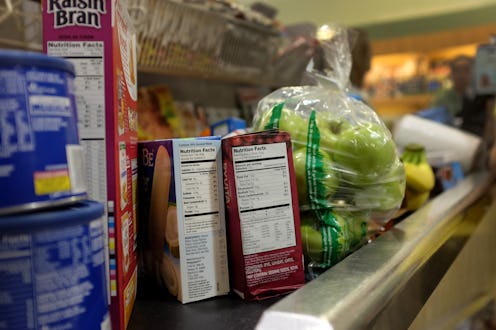Life
9 Health Food Buzzwords That Can Be Misleading
We all know how important it is to read nutrition labels when shopping for groceries, but unfortunately, many of these products aren't as straightforward as they seem. Even foods labeled "healthy" or "filled with vitamins and minerals" can be unhealthy, as there are are certain misleading labels that are often slapped onto foods. Knowing which words are legitimate and which are just used deceptively for marketing purposes can help us make healthy choices while at the grocery store.
"Food labels tend to be misleading because there are so many terms that are not defined even though they sound official," says Adina Fradkin, MS, RD, LDN over email. "Ultimately, food companies want you to buy their product, so sometimes they use words that make you think something about that product. However your perception of that description or label may be quite different from what it actually means."
The description on the front of the product may seem tempting, but it's more important to look on the back and pay attention to the ingredient list as well as nutrition facts. If you need a little guidance when it comes to buying food at the grocery store, watch out for these nine health food buzzwords that are essentially meaningless.
1. All Natural
All-natural sounds healthy, but there are no formal regulations regarding the word, so companies can stick it on anything. "There is a longstanding policy that the food shouldn’t have artificial colors or flavors, but it is not a formal rule and doesn’t extend to GMOs, high-fructose corn syrup, etc.," says certified nutritionist Tara Coleman over email.
2. Organic
"Organic is a regulated label and, in my opinion, opting for as many organic products as possible will have a positive impact on your health," says Coleman. Organic foods are never genetically modified and don't contain pesticides, so they're a good choice for certain types of grains and produce. "Having said that, the term only applies to the quality of the ingredients," says Coleman. "So an organic cookie is still a cookie and has not magically turned into broccoli." Organic sugar is still sugar, after all.
3. Sugar-Free
Sugar-free might mean no added cane sugar, but it doesn't mean it doesn't have some sort of artificial sweetener. "Sugar-free items, such as chocolate, use sugar alcohols to provide the sweetness," says Tiffany Newenhouse, RD over email. "While some can handle these additives fine, others may experience an upset stomach. So next time you reach for sugar-free ice cream, don't be surprised if you feel bloated or uncomfortable afterwards."
4. Cage-Free/Free-Range
When you see these terms, you likely picture chickens running free in a field, but sadly that is not always the case. "Typically they are still enclosed in a large, crowded barn and not allowed access outdoors," says Coleman. "Free-range means that they do have access to the outdoors, but it does not mean that they use it (i.e. there is an open door in the barn)." If you are concerned about the treatment of the animals and the quality of the eggs, Coleman suggests looking for "pasture-raised eggs," and to do a little research on the farm.
5. Whole Grain
It's good that you want to choose a whole-grain loaf of bread over a processed white one, but some products labeled whole grain can still contain a majority of white flour. "If you want to purchase a fully whole grain product, make sure the label specifies '100 percent whole grain' so that you know the entire product is made with whole grains and that it's not just a minor ingredient in the overall product," says Fradkin.
6. Made With Real Fruit
Many juices, snacks, and candies say "Made With Real Fruit," but this doesn't mean the product is a healthy, fruit-filled choice. "As long as there is some amount of real fruit in the food, the label can say this, but the consumer really doesn't know the actual percentage of the product that is made with real fruit," says Fradkin. "You can use the ingredient list on foods to tell if there more real fruit than fruit concentrate, for example, by looking at the order of foods listed. Foods higher up on the list are a greater percentage of the ingredients."
7. Local
Buying local produce means getting fruits and vegetables that have maintained more of their nutrients, as they are picked at peak ripeness and don't lose any vitamins and minerals from traveling a long distance. However, "local" can mean many different things. "This word is also not regulated and defined differently by different food stores, so you have to ask to see how local is defined by that vendor," says Fradkin. "Some stores might consider 'local' as double the distance that another competitor uses."
8. Artisan
"This word conjures up the image of a small town baker milling their own grains and creating a delicious dish that has been passed down from generation to generation," says Coleman. "In reality, there is no official definition for artisan, so it has zero significance."
9. Trans-Fat Free
"A product that is labeled as no trans fat does not have to be entirely trans-fat free," says Coleman. "Instead, it has to have less than 0.5g per serving, so it is still present. If you are having more than one serving, it can really add up! Instead look at the ingredient list. If there are any 'partially hydrogenated oils,' put it back."
When in doubt, avoid packaged, processed foods with tempting sounding buzz words, and opt for whole foods that you can make it home — these will be sure to be free of any unhealthy additives.
Images: Pixabay (10)
